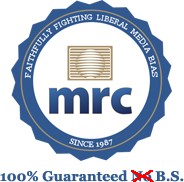The Media Research Center’s Brad Wilmouth loves to try and lamely parse to deflect from sins committed by conservatives; witness his attempts to deny that Donald Trump supported the death penalty for the ultimately exonerated Central Park Five. Wilmouth tried to tackle two of them in an April 2 post:
On Tuesday’s Amanpour & Co. on PBS, NPR All Things Considered weekend host Michel Martin did an interview with Stuart Stevens, one of those GOP strategists who became red-hot Never Trumpers. Stevens insisted “the original sin of the modern Republican party is race,” and Martin used that to rip into Ronald Reagan and George H.W. Bush.
Martin agreed that “race has been used by the Republican party for an awfully long time” She not only incorrectly claimed that it was the 1988 Bush campaign that ran “the Willie Horton ad” in 1988, but she also repeated the discredited myth that candidate Ronald Reagan announced his candidacy for President at the site where three civil rights workers were murdered in Mississippi.
[…]In fact, Reagan didn’t announce a campaign in Philadelphia, Mississippi, and certainly not where activists were murdered. The claim used to be it was his first stop after the Republican convention in 1980. That is also wrong. In fact, the Gipper spoke at the same Neshoba County State Fair where some Democratic presidential candidates, including Michael Dukakis, also spoke over the years, because it was a good place to reach many voters.
Anyone old enough to remember 1988 knows the Bush campaign never ran a Willie Horton ad (a pro-Bush PAC did). They did air a commercial on the weekend prison-furlough program of Governor Dukakis.
This is a slight change from Wilmouth’s previous defense of Reagan’s Mississippi appearance, when he insisted that the county fairgrounds weren’t actually in Philadelphia, Miss., and the civil rights workers weren’t actually murdered in town. Still, it’s highly unlikely that Reagan didn’t know about that history, or that his reference in the speech to “states’ rights” — which is what the controversy over the speech is ultimately about, though Wilmouth doesn’t mention it — was not a dog-whistle reference that white Southerners would understand. We suspect those Democratic presidential candidates didn’t talk about “states’ rights.”
While it’s true that the Bush campaign didn’t actually create the notorious Willie Horton ad, the campaign did benefit from it to the point that Bush’s 1988 campaign manager, Lee Atwater, said that “By the time we’re finished, they’re going to wonder whether Willie Horton is Dukakis’ running mate.” Which makes Wilmouth’s attempt to distance Bush from the ad rather absurd.
